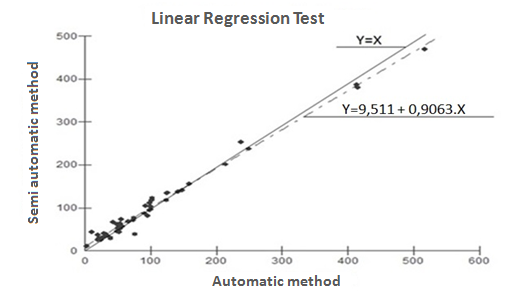The use of semi-automated methodology does not interfere significantly in the activity measurement of the urinary gamma-glutamyltransferase in dogs
DOI:
https://doi.org/10.21708/avb.2019.13.3.8380Resumen
The urinary gamma-glutamyltransferase (GGTu) is a precocious indicator of renal lesion and the gold standard for the measurement of its activity is the automated method, although semi-automation is often utilized and studies relating this methodology to the occurrence and intensity of analytical errors are still scarce. Therefore, this work aimed to calculate the systematic and random errors in the determination of the GGTu activity in dogs with the use of the semi-automated method and evaluate if that methodology statistically differs from the automated method. 49 dog urine samples were collected through cystocentesis and centrifuged for separation of the supernatant, which was employed for the measurement of the GGTu activity by automated (reference) and semi-automated methods. Linear regression and Pearson correlation (r) tests were employed for the establishment of the systematic error. The random error was calculated according to Westgard; Hunt (1973). Lin’s concordance correlation coefficient was employed to evaluate the presence of concordance between automated and semi-automated techniques. In the analysis of results, a constant error of + 9.51 UI/L (a = 9.5118), a proportional error of – 9.37% (b=0.9063) and a random error of 9.91% was observed when the semi-automated methodology was employed. The determination (R2) and Lin coefficients were, respectively, 0.9859 with p<0.0001 and 0.9912, suggesting a great similarity and almost perfect concordance between the two methods. Therefore, the data verified that the semi-automation does not interfere significantly in the measurement of the GGTu activity within the minimum and maximum values observed in the study.
Descargas

Descargas
Publicado
Número
Sección
Licencia
Autores que publicam na Acta Veterinaria Brasilica concordam com os seguintes termos: a) Autores mantém os direitos autorais e concedem à revista o direito de primeira publicação, com o trabalho simultaneamente licenciado sob a Licença Creative Commons Attribution que permite o compartilhamento do trabalho com reconhecimento da autoria e publicação inicial nesta revista. b) Autores têm autorização para assumir contratos adicionais separadamente, para distribuição não-exclusiva da versão do trabalho publicada nesta revista (ex.: publicar em repositório institucional ou como capítulo de livro), com reconhecimento de autoria e publicação inicial nesta revista. c) Autores têm permissão e são estimulados a publicar e distribuir seu trabalho online (ex.: em repositórios institucionais ou na sua página pessoal) a qualquer ponto antes ou durante o processo editorial, já que isso pode gerar alterações produtivas, bem como aumentar o impacto e a citação do trabalho publicado (Veja O Efeito do Acesso Livre).


 Esta obra está licenciada com uma Licença
Esta obra está licenciada com uma Licença 